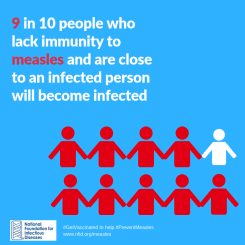Ecuador’s success against childhood diseases: Vaccination Week in the Americas 2019
During the last week in April, 2019, the Pan American Health Organization (PAHO) and its partners celebrate the 17th annual Vaccination Week in the Americas with the slogan “Protect your community. Do your part. #GetVax.”
“The slogan is a strong call to action to the general public, health care workers, and donors and decision makers to remind them that we each have an important role to play in supporting vaccination and keeping deadly diseases at bay.”
Ecuador has made huge strides in protection against communicable diseases and childhood viruses and invests USD $122.25 per person — in total, USD 35 million per year has been invested from 2016 to 2019, including vaccines and supplies. The Ecuadorian campaign is one of the largest in the region and this diligence has paid off. Formerly deadly viruses including polio, measles, rubella and diphtheria have been eradicated in Ecuador. There has been a dramatic decrease in the incidence of pneumonia, meningitis, and illness and death from diarrhea.
 According to the Oxford Vaccine Group, herd immunity describes how a population is protected from a disease after vaccination by stopping the germ responsible for the infection being transmitted between people. In this way, even people who cannot be vaccinated can be protected. For example, the bacteria meningococcus and pneumococcus can cause blood poisoning (septicaemia) and meningitis. In most people, the bacteria live harmlessly in the throat and do not cause disease, but sometimes they get into the bloodstream leading to these severe infections. They can live harmlessly in the throat of one person but if they spread to someone who is particularly susceptible (such as a young baby) they can cause severe disease. By being vaccinated an individual is not only protected from being infected themselves but they then also cannot pass this infection onto other people, where it may cause severe disease. However, for herd immunity to work, a large proportion of the population need to be vaccinated.
According to the Oxford Vaccine Group, herd immunity describes how a population is protected from a disease after vaccination by stopping the germ responsible for the infection being transmitted between people. In this way, even people who cannot be vaccinated can be protected. For example, the bacteria meningococcus and pneumococcus can cause blood poisoning (septicaemia) and meningitis. In most people, the bacteria live harmlessly in the throat and do not cause disease, but sometimes they get into the bloodstream leading to these severe infections. They can live harmlessly in the throat of one person but if they spread to someone who is particularly susceptible (such as a young baby) they can cause severe disease. By being vaccinated an individual is not only protected from being infected themselves but they then also cannot pass this infection onto other people, where it may cause severe disease. However, for herd immunity to work, a large proportion of the population need to be vaccinated.
Ecuador considers immunization as important as water purification, since it prevents deadly diseases. Throughout the country health workers conduct door-to-door campaigns to ensure that infants and children receive life-saving vaccines. Coverage in 2019 is reported at 85.2%, and according to the Ministry of Health, the 14.7% balance will be immunized this year.
 The Ministry also offers the influenza vaccine to pregnant women and seniors, who are vulnerable to this disease.
The Ministry also offers the influenza vaccine to pregnant women and seniors, who are vulnerable to this disease.
On April 9, 2019, New York City’s Mayor Bill de Blasio declared a public health emergency due to measles. There is now an order for mandatory vaccinations under threat of a fine in Williamsburg, a Brooklyn neighborhood where the disease is spreading. NYC Health reports that as of April 18, 2019, there have been 359 confirmed cases of measles in Brooklyn and adjoining borough Queens, with most cases involving members of the Orthodox Jewish community.
According to the European Centre for Disease Prevention and Control, unvaccinated or previously uninfected people are 100% susceptible to measles. Measles is highly contagious and can spread to others through coughing and sneezing. Also, measles virus can live for up to two hours in an airspace where the infected person coughed or sneezed. If other people breathe the contaminated air or touch the infected surface, then touch their eyes, noses, or mouths, they can become infected. Measles is so contagious that if one person has it, up to 90% of the people close to that person who are not immune will also become infected.
Children under five years and adults older than 20 years are more likely to suffer from measles complications including common ones like ear infections and diarrhea, but severe complications include pneumonia, encephalitis, and for pregnant women, premature birth or low-birth-weight babies.
Measles can be prevented with the MMR (measles, mumps, and rubella) vaccine – it is 97% effective with two doses, and 93% effective with one dose. Before the measles vaccination program began in 1963 an estimated 3 to 4 million people got measles yearly, about 400-500 died, 48,000 were hospitalized, and 1,000 developed encephalitis.
__________________
Sources
ElComercio.com. USD 122 por joven se invierte en vacunas.
OVC.ox.ac.uk. Herd Immunity: How does it work?
TheGuardian.com. New York City declares emergency over measles as cases double in two months.





















